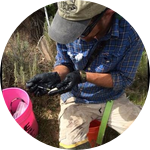Freshwater Science
Categories

Freshwater research takes a closer look at inland aquatic ecosystems such as rivers, lakes, reservoirs, and wetlands, and includes the management, health, and conservation of organisms that live in these environments.
The Projects
Browse the participating projects
Impacts of Oil and Natural Gas on Your Native Fishes
Stressors like oil and natural gas (ONG) development have rendered many freshwater ecosystems and their...
Something's fishy: the effects of non-native rainbow trout farming on Neotropical cloud forest streams
Introduced rainbow trout can have profound effects on the chemical and biological characteristics of temperate...
The Effects of High Flow Rates on the Giant Mayfly Nymphs and Their Burrows
It is predicted that extreme weather events due to climate change will result in higher than average streamflow...
How Does Iron Affect the Growth of Harmful Algae?
Blue green algae (BGA) blooms are becoming alarmingly frequent and conspicuous across the world, posing...
More About This Challenge
The sciency details
Challenge Aims
From the chemistry and geological processes at work, to the biology and ecology of the plants, animals, or bacteria that use the water systems, freshwater science is at the intersection of many different disciplines and has a huge impact on the general public.
We will be launching a new grant challenge to feature projects working on freshwater ecosystems. These campaigns will launch their fundraising efforts in late October. The projects with the most backers will receive extra funding towards their campaigns. If you are working in freshwater science, please submit a project idea below by October 10th to join the challenge!
Once you submit, our team will review your proposal and get back in touch to help you prepare for publishing your project page in the weeks leading up to launch day.
Some past examples of successfully funded projects in freshwater research:
How Much Carbon is Being Sequestered in Deep Reservoir Sediments?
Understanding Vernal Pool Hydrology and Animal Use
An environmental DNA (eDNA) approach to discovering life in NYC Ponds
Discovering Maine's Own Freshwater Snail
Freshwater Biodiversity Crisis: Is Restoration the Key?
Project Eligilibity
Any project conducting research in or on freshwater ecosystems is invited to participate. Please get in touch if you aren't sure about your idea, by emailing us at support@experiment.com. Interdisciplinary projects are more than welcome! Researchers must be based out of institutions or organizations in the US, UK, Australia, or Canada.




 Challenge Grants
Challenge Grants